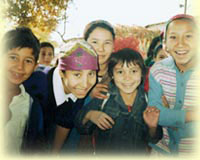
The hallmark of ECOLOGIA's work has always been to work with innovative leaders in dynamic, fluid transition situations, often before trends are dominant or even clear to most others. Our partners range from emerging informal organizations through which grassroots citizens express their hopes, to business entrepreneurs seeking creative ways to raise the standard of living for workers and communities.
Roots
ECOLOGIA developed out of the dominant historical event of the second half of the 20th Century, the Cold War between the United States and the Soviet Union. Our founding board members and staff grew up during this era, struggling with its threats and its realities. In the late 1980s, when the Soviet Union opened up, the opportunities for peaceful citizen diplomacy energized our earliest work.
ECOLOGIA (ECOlogists Linked for Organizing Grassroots Initiatives and Action) was founded by grassroots environmental activists from the United States, in 1989, in order to support grassroots environmental initiatives across the Soviet Union and eastern Europe. Non-governmental organizations (NGOs), especially environmental ones, were playing an important role in the political, social, and economic transitions of the time. From our base in Northeastern Pennsylvania, ECOLOGIA's founding staff and board members traveled frequently to these countries between 1988 and 1991. Working without any pre-determined agenda, we found common ground with leaders of emerging environmental organizations. We began by listening, designing programs that responded to practical needs identified by our new-found colleagues, and initiating our partnerships with small projects that achieved concrete results.
Scientific Skills, Public Participation, and Environmental Management ECOLOGIA recognized that environmental NGOs in the Former Soviet Union and Eastern Europe were able to establish their credibility by providing high quality independent expertise and by advocating scientifically grounded policies. By contrast, Americans tend to approach environmental activism from a distinctly political perspective, viewing broad public participation as the key to success. ECOLOGIA brought these perspectives together, into an organizational strategy combining professional quality environmental science with effective public participation mechanisms. For example, starting in 1992, ECOLOGIA's Citizens' Environmental Monitoring Network provided NGOs in eleven countries with equipment and training to check for and publicize water pollutants, as a step toward changing industrial practice and public policy.
Working within the framework of the Local Agenda 21 process for sustainable development planning, which grew out of the 1992 Rio Earth Summit, ECOLOGIA's "Sustainable Development in Nuclear Regions" (1999-2004) program worked with Russian and Lithuanian communities to reduce energy needs, to create new job opportunities and thus to reduce dependency on nuclear power and nuclear weapons production.
Led by initiative from Russian staff, ECOLOGIA became increasingly involved in helping Russian enterprises implement environmental management systems in order to reduce pollution and production costs. From this starting point, we saw that business standards have great potential for broader societal improvement. ECOLOGIA participated in the development of the ISO 14000 international environmental management standards, contributing especially to the ISO greenhouse gas accounting standards (giving ground rules for measuring emissions and reduction, reporting and verification).
Community-based Grants
We realized there is a great untapped resource for change in many countries - the newly forming grassroots community groups. These groups can be greatly boosted by small grants, to enable them to carry out community improvement projects of their own design. ECOLOGIA developed small grants programs, most particularly in the Baltic nations (1992-2003). Convinced of the great "ripple effect" of such small grants, we realized that many community organizations worldwide could benefit from them. But groups in developing countries had no way to connect with potential supporters from other countries. Likewise, the international philanthropic impulses of many middle-income Americans tended to be stifled by a lack of personal knowledge of specific groups and projects for whom a relatively modest amount of money would make a real difference.
So in 1996 we created the Virtual Foundation, which screened and posted projects on its website, enabling donors to choose directly among them. A notable example of the flexibility and potential of this process occurred in response to the United States bombing of the Embassy of China in Belgrade, Yugoslavia in 1999. As relations between the two countries disintegrated, we initiated the planting of a "Chinese-American Friendship Forest" next to the Great Wall just west of Beijing. We used the Virtual Foundation as the mechanism to publicize and fund this project. And after the major earthquake in Sichuan Province in China, August 2008, we organized on-the-ground earthquake relief efforts in rural communities, funded through the Virtual Foundation.
The Virtual Foundation website at its height had information on approximately 150 projects (funded and unfunded) in the fields of environment, human health, sustainable economic activity, and poverty alleviation. However, starting around 2003 there was a significant decline in United States foundation grants to NGOs for international programs that maintained local affiliate offices on the ground; many of the Virtual Foundation consortium members who worked directly with grassroots people in their own countries found their budgets cut so severely that their flexible outreach programs were halted. The Virtual Foundation depended on reliable local consortium members, so these cutbacks also restricted the variety of projects we could obtain and vouch for. These cutbacks were coupled with increasing economic and political difficulties for local NGOs in a number of countries. The Virtual Foundation still operates but on a very limited basis, more as a fiduciary agent than an active source of funding for new projects. See
ECOLOGIA's Virtual Foundation.
Move to Vermont
In early 2000, ECOLOGIA moved its US headquarters to Middlebury, Vermont. Vermont's long tradition of community participation, environmental awareness, and respect for individual differences reinforces ECOLOGIA's organizational values. Middlebury is a congenial place for staff to live and work, and it provides an inspiring workplace for our international colleagues. ECOLOGIA for many years was an active member of the state-wide network of Vermont Businesses for Social Responsibility (VBSR). As a Research Scholar in Environmental Studies at Middlebury College, ECOLOGIA's President, Randy Kritkausky, worked on academic and international service learning activities at Middlebury College and at the Monterey Institute for International Studies (MIIS).
Involvement in China
From the late 1990s for about fifteen years, ECOLOGIA shifted its geographic focus from the former Soviet Union and central Europe, to China. This evolution reflected many larger global trends, as the dynamic economic rise of the Chinese opened many opportunities for social and environmental, as well as economic, development. With our Chinese partners, we shared the goals of establishing long-term sustainable development in China and for its partners in other countries. We maintained a locally staffed affiliate office in Chengu for almost ten years. (See Sustainable Development in China for more information.)
International Standards - An aspect of global governance
The International Organization for Standardization (ISO) encourages global trade and economic activity by creating international standards. First were those for manufactured items - the classic nuts and bolts - followed by activities such as air traffic control. Quality control in manufacturing, covered by the ISO 9000 series, was followed by environmental management systems (the ISO 14000 series), including greenhouse gas accounting standards which are crucial for measuring and trying to reduce actions that contibute to climate change. ISO later entered into the corporate social responsibility field with ISO 26000 and related standards such as circular economy and ESG (environmental, social and governance) measurements for use by investors. ECOLOGIA's international staff worked on numerous ISO standards; ECOLOGIA achieved official status within ISO as an 'International NGO". For more information, see Environmental Management Systems Partnerships - ISO 14000 and
ISO 26000 - Changing Organizational Cultures.
Sustainable Development and Corporate Social Responsibility
Starting at the ground level in 2005, ECOLOGIA participated in the Working Group that created ISO 26000, the global social responsibility standard, from 2005 to its approval in 2010. Carolyn Schmidt was a member of the Post Publication Organization (2010-2018) that was created through the International Standards Organization (ISO) to track the uptake of ISO 26000 and monitor its use. When funding for the PPO was discontinued in 2018, the ISO 26000 Stakeholders Global Network (SGN) was created to continue and deepen the work of promoting the adoption and use of ISO 26000. See ECOLOGIA Works on Social Responsibility for more information.
The "Orthogonal Economy" is defined as "...that sector of mainstream and Main Street business activity where owners accept marginal profitability as a trade-off for maintaining personal, community and environmental well-being, because market-based solutions don't always work." In 2014, ECOLOGIA staff began interviewing small business owners as part of an effort to highlight this significant and different path which has implications for sustainable development in the long term. See The Orthogonal Economy for more information.
Indigenous Perspectives
Starting in 2020, ECOLOGIA has worked to connect with sources of Indigenous knowledge, to understand the importance of historic and spiritual connection to the land, and to build bridges of mutual respect and cooperation between Indigenous and mainstream communities. See Centering Indigenous Experiences.
Motives and Mission - Global Impact
"Replacing international conflict with environmental cooperation contributes to the solution of global environmental problems, encourages face-to-face encounters of people from different cultures, and thereby increases the possibility that future generations will live in peace." Despite all our organizational changes and new programs, major global shifts since 1989, and troubling current American politics, ECOLOGIA's original mission statement remains at the core of our organizational culture.
Establishing and strengthening a global civil society is necessary for truly sustainable development. This will enable people to reach their full potential while respecting the rights of others and the limits of our ecosystem. ECOLOGIA's people and programs work toward these goals.
|




